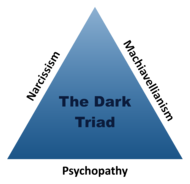
Back مكيافيلية (علم نفس) Arabic Makyavelizm (psixologiya) Azerbaijani ماکیاولیسم (روانشناسی) Persian מקיאווליזם (פסיכולוגיה) HE Makiavelisme (psikologi) ID Machiavellisme (psychologie) Dutch Makiawelizm (psychologia) Polish Makyavelizm (psikoloji) Turkish 馬基雅維利主義 (心理學) Chinese 馬氏主義 (心理學) ZH-YUE
| Machiavellianism | |
|---|---|
 | |
| Machiavellianism is one of the traits in the dark triad model, along with psychopathy and narcissism. | |
| Specialty | Personality psychology |
| Causes | Genetic and environmental[1][2] |
In the field of personality psychology, Machiavellianism (sometimes abbreviated as Mach) is the name of a personality trait construct characterized by interpersonal manipulation, indifference to morality, lack of empathy, and a strategic focus on self-interest.[3][4][5][6] Psychologists Richard Christie and Florence Geis named the construct after Niccolò Machiavelli, as they used edited statements inspired by his works to study variations in human behaviors.[7][8][9] Their Mach IV test, a 20-question, Likert-scale personality survey, became the standard self-assessment tool and scale of the Machiavellianism construct. Those who score high on the scale (High Machs) are more likely to have a high level of manipulativeness, deceitfulness and a cynical, unemotional temperament.[10][11]
It is one of the dark triad traits, along with the subclinical versions of narcissism and psychopathy.[12][13][14]
- ^ Vernon, Philip A.; Villani, Vanessa C.; Vickers, Leanne C.; Harris, Julie Aitken (January 2008). "A behavioral genetic investigation of the Dark Triad and the Big 5". Personality and Individual Differences. 44 (2): 445–452. doi:10.1016/j.paid.2007.09.007.
- ^ Cite error: The named reference
Schermer-2020was invoked but never defined (see the help page). - ^ "APA Dictionary of Psychology".
- ^ Jones, Daniel N.; Paulhus, Delroy L. (2009). "Machiavellianism". In Leary, Mark R.; Hoyle, Rick H. (eds.). Handbook of Individual Differences in Social Behavior. Guilford Press. pp. 93–108. ISBN 978-1-59385-647-2.
- ^ Geis, Florence; Christie, Richard; Nelson, Carnot (1970). "In Search of the Machiavel". Studies in Machiavellianism. pp. 76–95. doi:10.1016/B978-0-12-174450-2.50010-5. ISBN 978-0-12-174450-2.
- ^ "Machiavellianism | Definition, Politics, Psychology, & Facts | Britannica". www.britannica.com. 2023-05-02. Retrieved 2023-06-21.
- ^ Christie & Geis 1970, p. 339.
- ^ Colman, Andrew M. (2015). "Machiavellianism". A Dictionary of Psychology. Oxford University Press. p. 434. ISBN 978-0-19-965768-1.
- ^ Rauthmann, John F.; Will, Theresa (30 April 2011). "Proposing a Multidimensional Machiavellianism Conceptualization". Social Behavior and Personality. 39 (3): 391–403. doi:10.2224/sbp.2011.39.3.391.
- ^ Spielberger & Butcher 2013.
- ^ Geis, F. L. (1978). "Machiavellianism". In London, Harvey; Exner, John E. (eds.). Dimensions of Personality. Wiley. pp. 305–363. ISBN 978-0-471-54392-3.
- ^ Paulhus, Delroy L; Williams, Kevin M (December 2002). "The Dark Triad of personality: Narcissism, Machiavellianism, and psychopathy". Journal of Research in Personality. 36 (6): 556–563. doi:10.1016/S0092-6566(02)00505-6. S2CID 6535576.
- ^ Lyons 2019, p. 2.
- ^ Furnham, Adrian; Richards, Steven C.; Paulhus, Delroy L. (March 2013). "The Dark Triad of Personality: A 10 Year Review". Social and Personality Psychology Compass. 7 (3): 199–216. doi:10.1111/spc3.12018.
© MMXXIII Rich X Search. We shall prevail. All rights reserved. Rich X Search